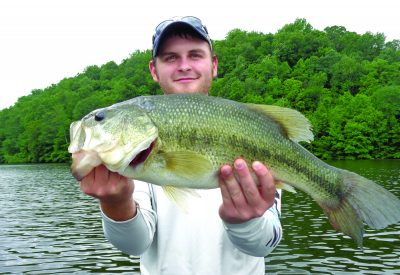by Capt. Jake Davis
Most beginning fishermen experienced their first encounter with the sport on a small body of water, either a pond or small lake. How to fish these small bodies of water may be confusing, especially if the newcomer is accustomed to watching pros on the outdoor shows that race up and down large reservoirs in $60,000 bass boats. Likewise, one of the mistakes we as seasoned anglers make is not utilizing these small bodies of water to stay in tune or practice new techniques.
The landscape is loaded with tens of thousands of small lakes making them very accessible fishing waters to the majority of fishermen. Most are great places to fish because you don’t need big boats or tons of tackle. Also, most of these small lakes will have fishing piers or areas which are accessible to bank fishermen.
Many seasoned bass anglers often overlook small lakes with the idea that there is no challenge or trophy fish to be caught. Nothing could be further from the truth. In most of the South, there are many small lakes which actually fish much better than their large counterparts. This is mainly due to lack of angler pressure, the diversity of topography, structure and vegetation in the lake. There may be smaller ponds, depressions, ditches, fence lines, old roads and any number of other structures that became flooded when the small lake was built. All these areas are potential fish holding structures. A large variety of aquatic weeds and shoreline vegetation can exist on small lakes as well, thus, making these smaller lakes the perfect place for anglers to practice and hone their skills for major careers such as for BASS Elite Angler Brandon Lester from Fayetteville TN.
Brandon says “growing up in Middle Tennessee, I cut my teeth on small bodies of water. Lakes like Tims Ford, Woods, and Normandy are the types of lakes that helped me lay the groundwork for a successful fishing career. I think the real advantage to small waters fishing is that it teaches you to break down a body of water more quickly. By that, I mean you learn to break down what section of the lake offers what types of structure, or maybe what part of the lake offers the biggest fish. It also teaches you that certain parts of the lakes are better during the spring, and likewise, some are better in the fall and winter”.
He goes on to say “I find myself going back to my roots often out on tour when I’m faced with a vast body of water. I like to pick a big creek or a big tributary and break it down just like I learned to do with our lakes. Once I have established a pattern in that area then I can try to look for other areas like it and it helps to eliminate a lot of water”.
When approaching a new lake, it helps to first talk to someone who has fished the body of water. If it is a public lake, agency personnel are often available with information about the hot places to fish and in some cases, there is a local fishing guide that will take you out. If no information is available, I will approach small lakes the same way I do a major lake such as Kentucky Lake, by fishing in areas similar to those that have produced in other lakes. You can rest assured that visible cover in small bodies of water will hold fish. Start around rocks, logs, stumps, brush piles and weed cover. Then, hang on for the excitement that is sure to come.
Capt. Jake Davis is a USCG Licensed Professional Fishing Guide/Outdoor Writer on Lake Guntersville, Normandy, Nickajack Woods Reservoir and Tim’s Ford. Visit www.midsouthbassguide.com or call/email 615-613-2382, msbassguide@comcast.net

